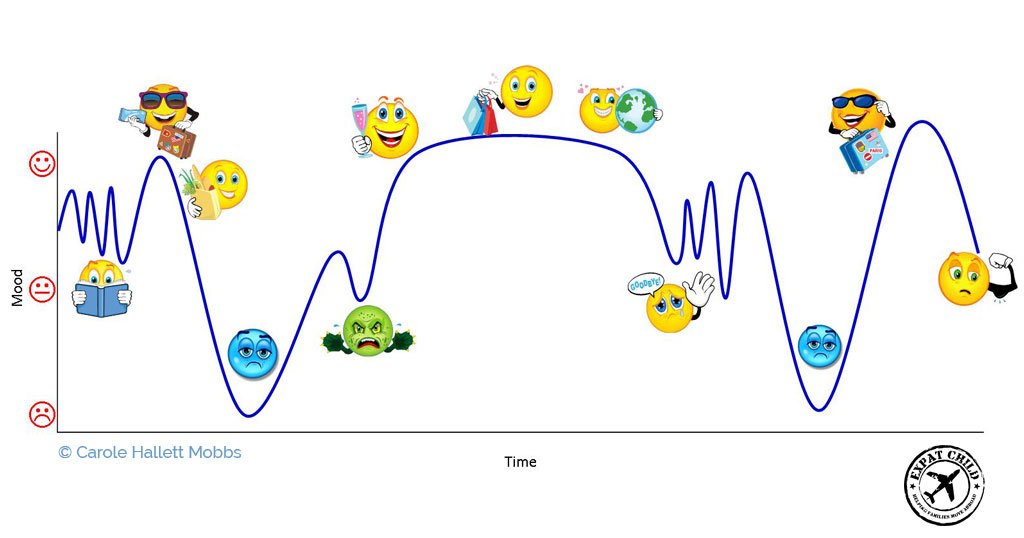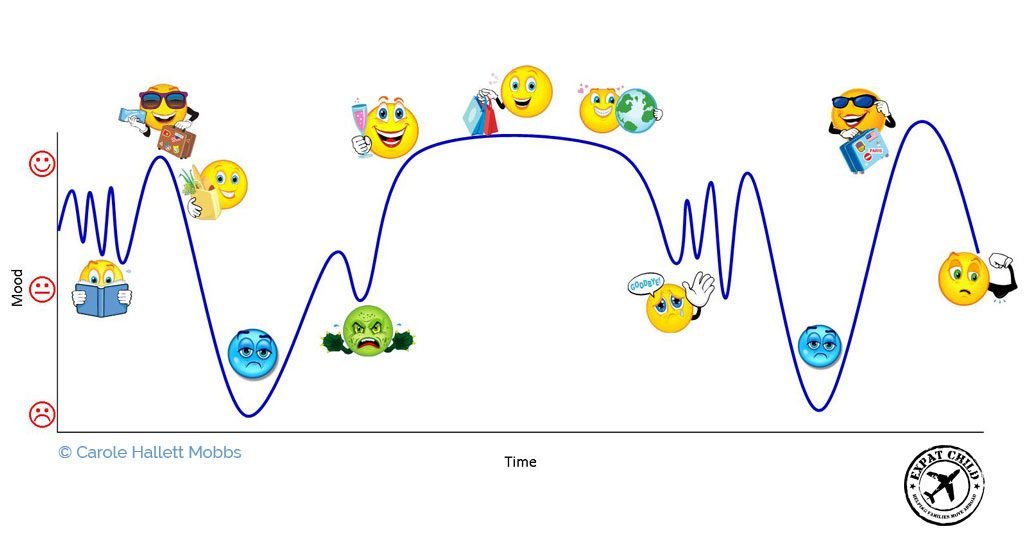Cultural adaptation
Original article published 6th November 2012
Updated several times and republished 1st July 2019
Further to my generalised article about culture shock, I decided to expand on certain aspects of this expat-relevant ‘condition’. As mentioned before, culture shock may hit you at a certain point of your stay in your new country; this may be instant, it may take about six months or even happen several years down the line.
Culture shock graph
There is a general graph that displays this movement.
Sometimes called the ‘Cultural Adaptation Curve’ amongst other titles, the shape is basically the same, clearly displaying that you do get over culture shock. After the big dip, the graph curves up again.
Personally, I think that graph over-simplifies the process and I have created another one which is more accurate, and more fun, I think. You can fill in your narrative for this as you please.
In the process of creating the graph above, and whilst writing the first post in this culture shock series, it suddenly dawned on me that I am still suffering culture shock after eighteen months of living here in Berlin. I recognise in myself many, if not most, of the symptoms – both psychological and physical. I am not happy. I am not depressed, but I am definitely not full of joy. This is not like me.
(Edited in 2017 to add – In retrospect, much of the problem was actually PTSD – Post-traumatic stress disorder – following the Japanese earthquake in 2011 and subsequent events, plus our move to Berlin, documented elsewhere.)
Anyway, I got a little distracted and tried to plot my own graph for the past few years.
Eventually, I simplified it to the following. Here is my personal cultural adaptation graph at the time of writing this. Doesn’t look good, does it? 
I know what I am supposed to do to help get over culture shock – get out there, meet people etc, and believe me, I have tried and tried. I know it isn’t ‘me’, as I had no problem in Tokyo or even when I moved around in the UK, but here… well, it is just not happening.
As tempting as it is to blame the place, apparently that is a symptom of culture shock in itself, so it’s hard to know where to go from that!
If anyone has any off-the-wall suggestions, please do let me know because I have tried absolutely everything in my power so far.
How does your personal graph look? It’s an interesting, if slightly time-consuming, exercise. And quite an eye-opener into expat resilience.
[Update: it’s now May 2013 and I can happily report that my cultural adaptation graph is back on the upturn! This has absolutely nothing to do with the country I’m living in right now (Germany), and more to do with the fact that I’m moving elsewhere! We’re off to South Africa. A lot has happened over the past few months, and this sense of ‘moving on’ is both metaphorical as well as literal. Whilst I realise I’m not supposed to ‘blame the country’, in my mind it’s obvious that not every relocation is a good one.]
Update – 10th February 2014
I’ve updated that graph now. As you can see I’m back ‘up there’ and can conclude that it wasn’t necessarily a culture shock problem in Berlin – I just didn’t like it there. Obviously this is a very simplified illustration of my life over the past few years – and in this graph it does look as if my mood was rising whilst in Berlin. This gentle climb was entirely down to me creating ExpatChild and the lifeline this project gave me.
It also shows that some countries just do not suit everyone. I do not consider it a ‘failure’ of any form to dislike a country that other people adore. I know I love some places that others can’t bear; everyone is different!
PS – yet another update to this subject, June 2014
I mentioned about physical and psychological symptoms of culture shock in a previous post. In it I added,
“Not every physical problem can be attributed to culture shock, of course, so seek help where necessary.”
Now in South Africa, it seems the medical care is brilliant! As a new patient with my GP, I was subjected to a battery of blood tests. Apparently this is normal for a new ‘customer’. Turns out I have hypothyroidism, undiagnosed for the entire time I was in Germany even though I went to the doctors with various symptoms… Now satisfactorily medicated for this I feel ‘normal’ again. Oh, and I’m also apparently post-menopause, so that’s nice too.
So the motto to this constantly changing tale is, if you don’t feel ‘right’, check with a doctor. You never know!
And this all reminds me of the wonderful ‘Hitchhikers Guide to the Galaxy’:
“We are now cruising at a level of two to the power of twenty-five thousand to one against and falling, and we will be restoring normality just as soon as we are sure what is normal anyway.”
~Douglas Adams






Hi Carole,
Great post! I think it is very interesting to see that there is a pattern in the graph where not everything is so good as we were expecting at the beginning.
In my opinion, that could be the stage where people is moving from being a “tourist” to a “resident”. If you are in a place where the cultural differences are bigger, i think the process may be a little bit longer.
Another though is that this process is different for each family member. They all live together, but they manage it differently.
Thanks!
I’ve been in China 8 months with 2 trips back home to USA and 1 trip back to visit our last location Indonesia. Still I struggle with day to day things. I still do not have any reliable friends that aren’t my husbands work friends. (And even those expats aren’t reliable on their off time)
I’m hanging in there. On the plus side… I’m learning to eat better and take better care of me.
8 months is still a really short time, especially if you have been back home twice in that time! Check out my article on visiting home for the first time. Keep on hanging in there and continue to look after yourself, it does get easier 🙂
I am 29.
I left Spain as a student (being 21), spent 5 years in Stockholm (got a job, a house, married my now husband) and nearly 3 in Tokyo. I feel that “Stockholm is my home”. Unfortunately, we are about to move back to Spain. I am terrified. I love being an expat. I know I will not fit in the Spanish culture again. Of course I can try, but somehow I feel that 8 years is too much, life in there will be “bland”.
I never worked in Spain. I can’t (and I don’t want to) work in Spanish. I will continue to work for the same “Swedish company”, but I know it won’t be the same. I wanted to stay in Japan as much as possible, but hey, he was tired.
Anyway. Your graph was such a huge relief, that I just wanted to thank you. Because it gives me peace of mind to feel that I am not alone, that some people really don’t have a good time going back to their home country. Just simply because they feel better being expats.
This morning, I met a lady who’s going to move into an apartment in our building. Same story. Spent 5 years in Japan, back to Europe, hated it, moved back. It’s just natural, you are no longer part of it, you have seen better things so, why should you “accept unhappiness”?
http://www.dontplayahate.com
Hi, and thank you for your comment.
I’m sorry you’re struggling right now. I can totally empathise! As can so many others – you are most definitely NOT alone in feeling like this. It’s often said that returning to your ‘home’ country is harder than any other posting.
Personally I haven’t made it back home yet: Germany was close enough for now! And yes, I can understand the wanting to stay in Japan – fabulous place; I was so, so sad to leave.
I do hope it all goes well for you and that it doesn’t live up to your expectations. Do keep in touch and let us know how you are doing.
Love the graphs!! It’s a cute interpretation of a very real and very upsetting phenomenon. I just got back to the U.S. after 10 months abroad. I understand the difficulty with meeting people…and it’s hard not to blame the country. Perhaps certain personalities just ‘mesh’ better with some cultures over others? But, at the same time, I found that all you need in the world to survive is 1 friend. 2 is exponentially better. What got me through was switching to a new apartment with nicer people, joining a gym, and eventually dating a local. One local introduces to you others. And exercise is not only a great stress reliever for culture shock, but also a way to meet people! Good luck in your travels.
Thank you, Samantha. I should really update my personal graph at some point!
I’ve got to start taking my own advice regarding finding friends! Not sure I fancy a gym, though… too much like hard work 😉
Currently mine is good. But it has ebbed and flowed for he past 5 years. One of our struggles as Aussies in the UK is that everybody assumes there is less culture shock in an English speaking country. This is simply not the case.
A personal struggle of mine is that I am an introvert, so to tell me to just get out and meet people is a double whammy 😉
Yes, that ‘instruction’ is much easier said than done, isn’t it? It doesn’t always help if you’re extrovert, either, when there is nowhere to actually meet people!
Interesting that culture shock is just as bad in a ‘same language’ situation – in my ignorance I had assumed a different language was the main issue. Thank you for clarifying.